Shane Nolan will wait until around 20 October to plant his winter barley. He said it is beside the sea in dry ground and he does not want the crop to get too advanced in the winter.
Delaying sowing will reduce the risk of virus, disease and grass weeds. He is hoping to get some Cassia seed as he gets on well with the variety.
Having dry land to be able to wait to plant is an advantage here.
Shane hopes to be drawing in maize this week when the weather allows. Shane is a contractor, but he does not have a maize header on his harvester as he does not have enough work for it, but another contractor will cut the crop and Shane will draw in and fill the pit.
Beet crop
His beet crop won’t be pulled until November. He will get the winter barley planted before then. It is coming on well. He has one field that has weeds in it, but in general he is happy with the crop.Shane said there is a lot of demand for beet this season. There are a lot of new customers ringing and booking some of the beet crop.
Shane still has the majority of his barley in the shed.
He has sold some locally and noted there are people looking for rolled barley at present.
Shane is waiting on a better price before he sells any barley out of the shed.
He also has some straw in the shed to sell over the winter, but a large amount of straw was sold and delivered out of the field.
James English was finishing planting his winter barley early this week.
He had a good mix of varieties, all six-row hybrids including SY Armadillo, Belfry and Bazooka. Ground was in great condition and the recent spell of good weather has seen James finish his winter wheat planting as well. Graham and Dawsum are the main varieties and they went in last week.
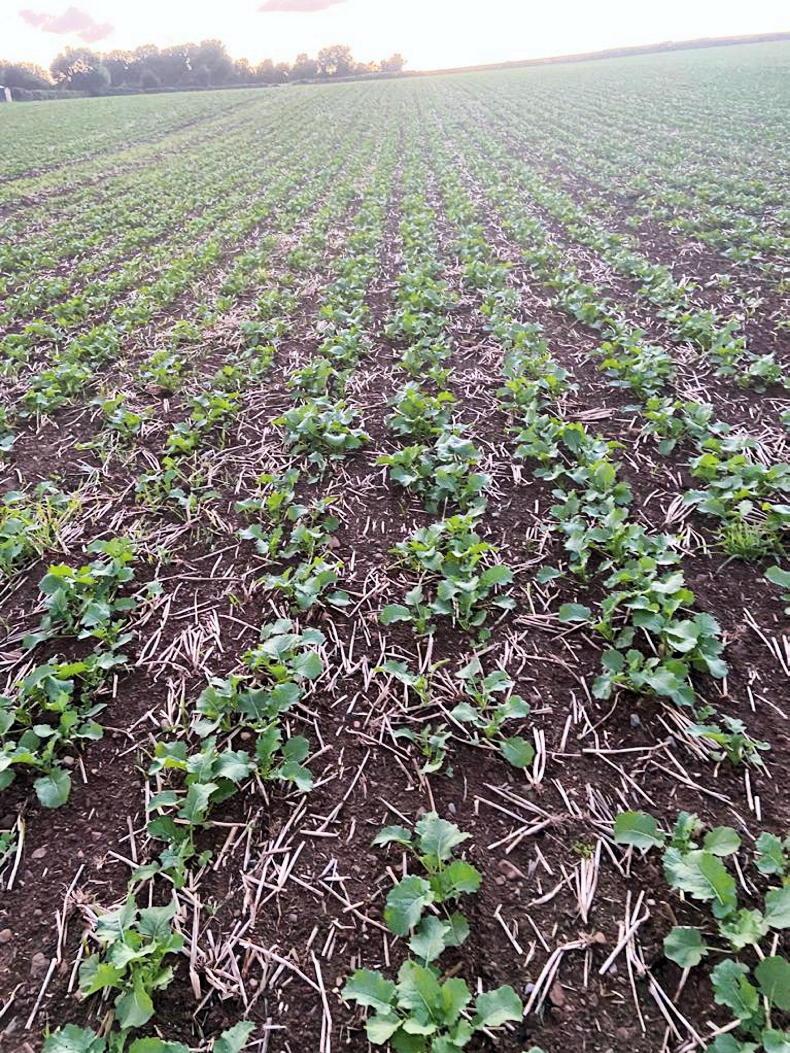
Oilseed rape on James English's farm.
Hybrid rye allows for early planting and that was planted on 20 September. James said it is up and looks well.
He is watching out for slugs in the crop, but it went into a fine and firm seedbed so this should help to reduce levels.
The winter wheat and rye were both rolled and this allowed for some pre-emergence herbicides to be applied.
Winter barley
The winter barley has not been rolled yet, but the herbicide will go on with an aphicide at the two to three-leaf stage as long as weather permits.
Firebird Met will most likely be used on both the wheat and the barley crops whether it is applied pre- or post-emergence.
Winter oats will be the last crop planted on the farm, but this will not be drilled until around 15 October. Those oats are for an equine contract and the variety is Husky.
All of James’s crops are going in using minimum tillage. Stubble cultivation was carried out after harvest to allow volunteers and weeds to germinate.
Glyphosate was applied and he is planting with a 6m Kverneland U-drill.
The oilseed rape looks very well. It had germinated just before the rain came and took off once moisture levels increased.
Again, slugs were not an issue, but the crop was watched. James noted that he will only apply slug pellets if there is an issue. The cultivation system on the farm may be helping to reduce slug levels.
Stuart Fitzgerald was busy spraying when we spoke earlier this week. He was well into winter planting at that stage. Winter wheat sowing had been completed. Graham and Dawsum were two of the main varieties on the farm, but Stuart also planted a mixture of varieties together to try and reduce disease pressure.
He mixed Graham, Dawsum, Costello, Astronomer and Conros. He has planted mixtures in previous years and they have performed to the same yields as the single varieties. All of the wheat is planted after a break crop of oilseed rape, beans or oats.
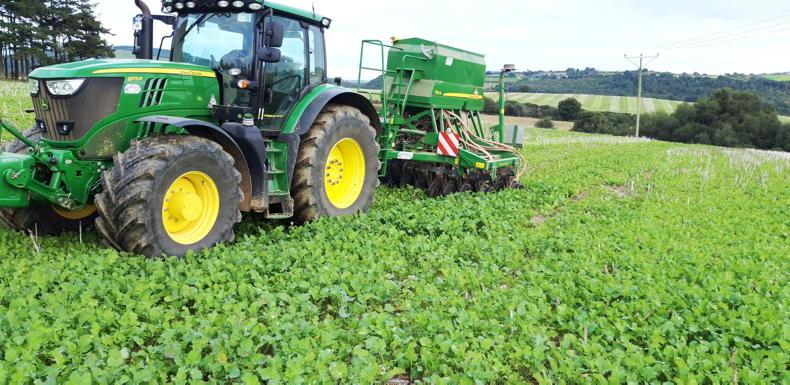
Stuart Fitzgerald planting winter wheat into volunteer oilseed rape.
Stuart plants with a John Deere 750A drill and plants directly into cover crops. For example, the picture shows Stuart planting winter wheat into volunteer rape. He sprays with glyphosate either before or after sowing depending on weather and how the work falls.
Stuart generally only uses a pre-emergence herbicide on the headlands of fields and around some telephone or ESB poles where there is a higher risk of grass weeds and where wheels are turning and giving weeds a higher chance to germinate.
Winter barley falls into the second slot on the rotation after either winter wheat or spring barley. This year KWS Joyau and Casting were the varieties being planted. Winter oats will be planted if weather allows at the end of this week. All crops have been rolled up to now.
No aphicide will be applied to crops on the farm. Stuart has not applied aphicides in a number of years.
Stuart said he plants earlier than some farmers as he is using a direct drill and needs to use the good ground conditions when they are there. With a lot of work to get through it also speeds things up. The oilseed rape is looking well on the farm.
It was under-sown with clover and the clover has also germinated. Slug pellets were applied to the headlands in some fields.
Shane Nolan will wait until around 20 October to plant his winter barley. He said it is beside the sea in dry ground and he does not want the crop to get too advanced in the winter.
Delaying sowing will reduce the risk of virus, disease and grass weeds. He is hoping to get some Cassia seed as he gets on well with the variety.
Having dry land to be able to wait to plant is an advantage here.
Shane hopes to be drawing in maize this week when the weather allows. Shane is a contractor, but he does not have a maize header on his harvester as he does not have enough work for it, but another contractor will cut the crop and Shane will draw in and fill the pit.
Beet crop
His beet crop won’t be pulled until November. He will get the winter barley planted before then. It is coming on well. He has one field that has weeds in it, but in general he is happy with the crop.Shane said there is a lot of demand for beet this season. There are a lot of new customers ringing and booking some of the beet crop.
Shane still has the majority of his barley in the shed.
He has sold some locally and noted there are people looking for rolled barley at present.
Shane is waiting on a better price before he sells any barley out of the shed.
He also has some straw in the shed to sell over the winter, but a large amount of straw was sold and delivered out of the field.
James English was finishing planting his winter barley early this week.
He had a good mix of varieties, all six-row hybrids including SY Armadillo, Belfry and Bazooka. Ground was in great condition and the recent spell of good weather has seen James finish his winter wheat planting as well. Graham and Dawsum are the main varieties and they went in last week.

Oilseed rape on James English's farm.
Hybrid rye allows for early planting and that was planted on 20 September. James said it is up and looks well.
He is watching out for slugs in the crop, but it went into a fine and firm seedbed so this should help to reduce levels.
The winter wheat and rye were both rolled and this allowed for some pre-emergence herbicides to be applied.
Winter barley
The winter barley has not been rolled yet, but the herbicide will go on with an aphicide at the two to three-leaf stage as long as weather permits.
Firebird Met will most likely be used on both the wheat and the barley crops whether it is applied pre- or post-emergence.
Winter oats will be the last crop planted on the farm, but this will not be drilled until around 15 October. Those oats are for an equine contract and the variety is Husky.
All of James’s crops are going in using minimum tillage. Stubble cultivation was carried out after harvest to allow volunteers and weeds to germinate.
Glyphosate was applied and he is planting with a 6m Kverneland U-drill.
The oilseed rape looks very well. It had germinated just before the rain came and took off once moisture levels increased.
Again, slugs were not an issue, but the crop was watched. James noted that he will only apply slug pellets if there is an issue. The cultivation system on the farm may be helping to reduce slug levels.
Stuart Fitzgerald was busy spraying when we spoke earlier this week. He was well into winter planting at that stage. Winter wheat sowing had been completed. Graham and Dawsum were two of the main varieties on the farm, but Stuart also planted a mixture of varieties together to try and reduce disease pressure.
He mixed Graham, Dawsum, Costello, Astronomer and Conros. He has planted mixtures in previous years and they have performed to the same yields as the single varieties. All of the wheat is planted after a break crop of oilseed rape, beans or oats.

Stuart Fitzgerald planting winter wheat into volunteer oilseed rape.
Stuart plants with a John Deere 750A drill and plants directly into cover crops. For example, the picture shows Stuart planting winter wheat into volunteer rape. He sprays with glyphosate either before or after sowing depending on weather and how the work falls.
Stuart generally only uses a pre-emergence herbicide on the headlands of fields and around some telephone or ESB poles where there is a higher risk of grass weeds and where wheels are turning and giving weeds a higher chance to germinate.
Winter barley falls into the second slot on the rotation after either winter wheat or spring barley. This year KWS Joyau and Casting were the varieties being planted. Winter oats will be planted if weather allows at the end of this week. All crops have been rolled up to now.
No aphicide will be applied to crops on the farm. Stuart has not applied aphicides in a number of years.
Stuart said he plants earlier than some farmers as he is using a direct drill and needs to use the good ground conditions when they are there. With a lot of work to get through it also speeds things up. The oilseed rape is looking well on the farm.
It was under-sown with clover and the clover has also germinated. Slug pellets were applied to the headlands in some fields.







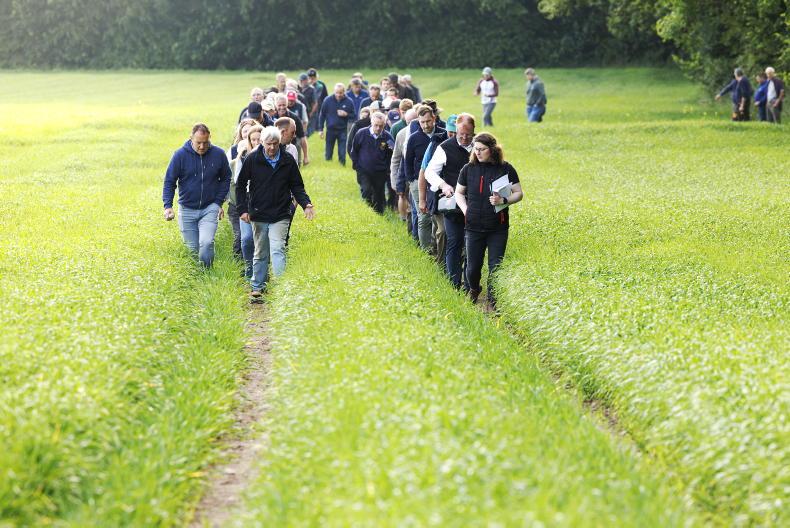

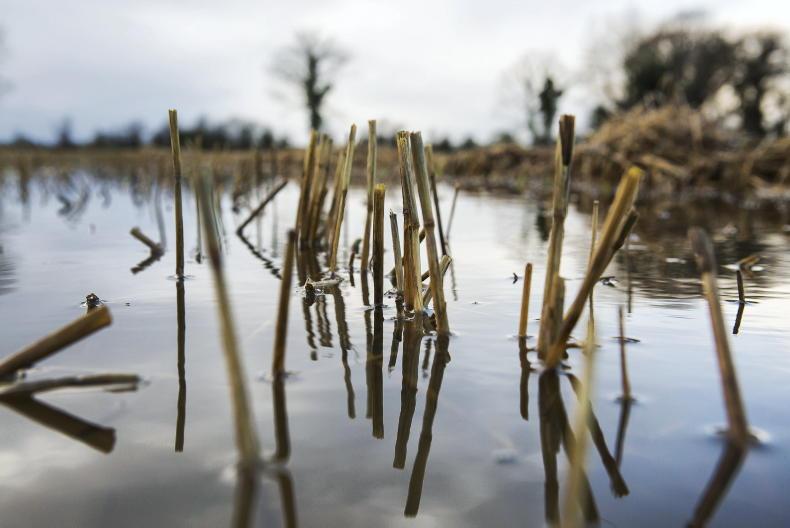
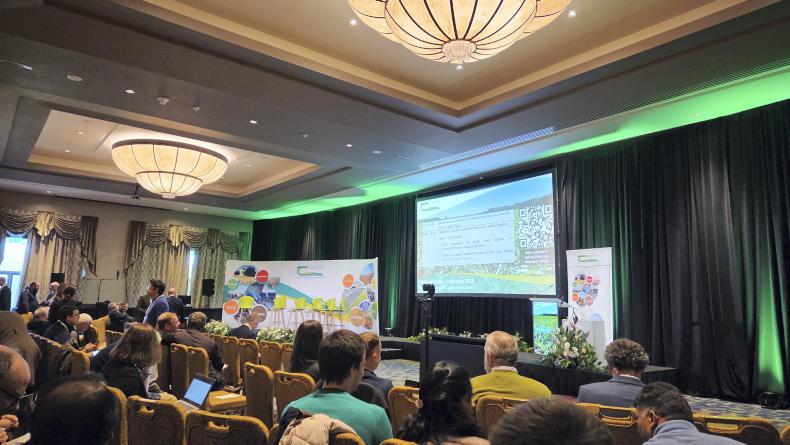
SHARING OPTIONS